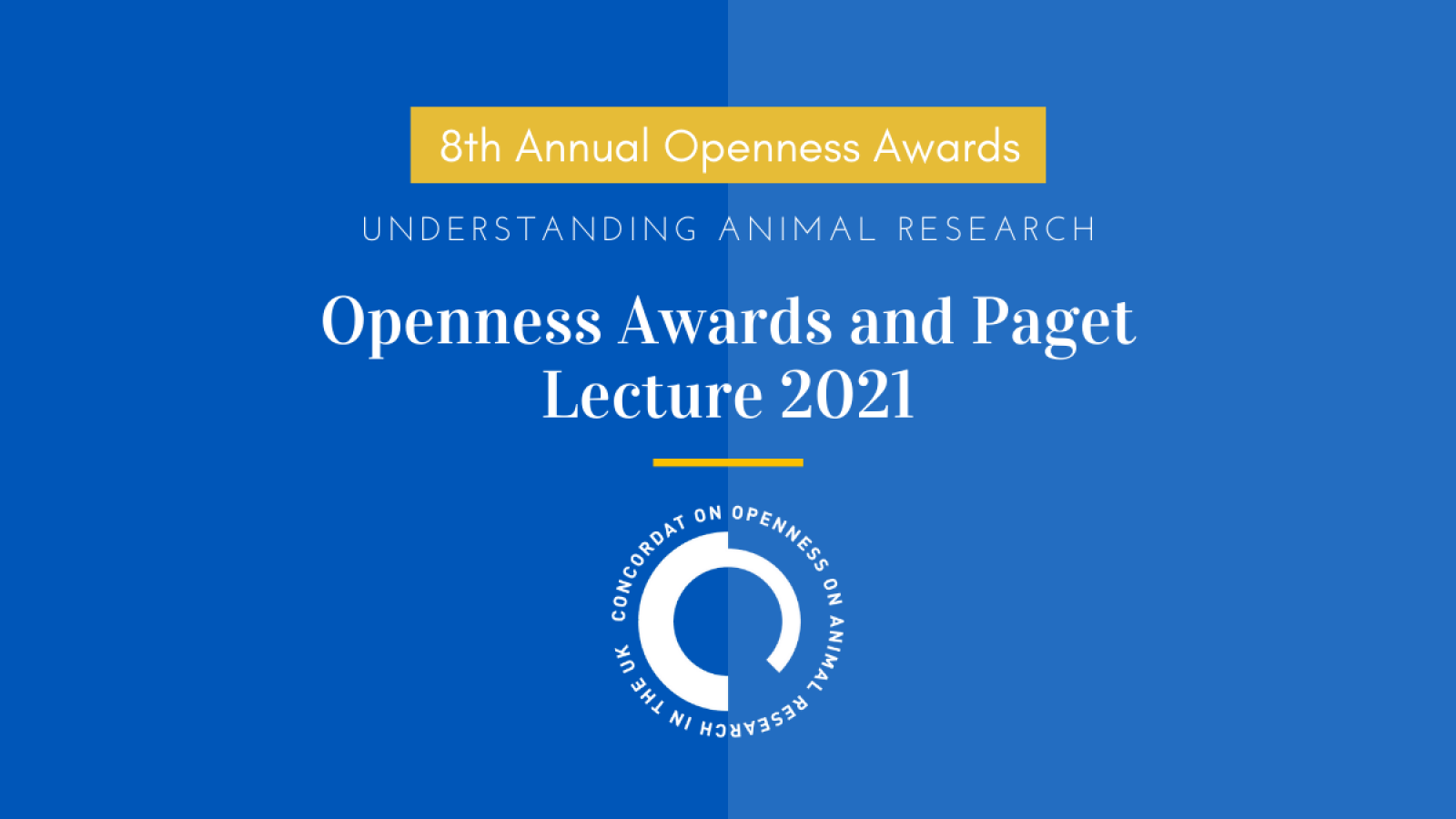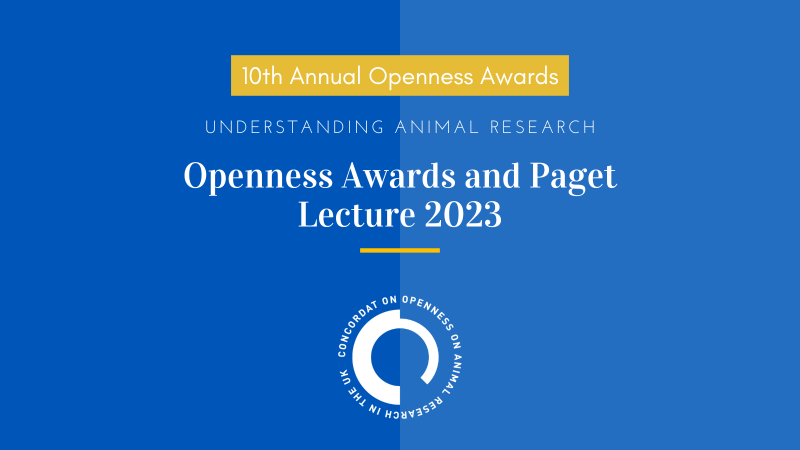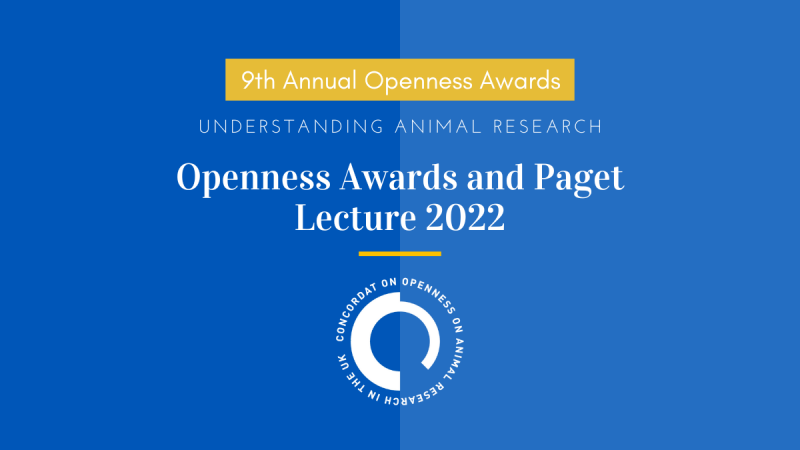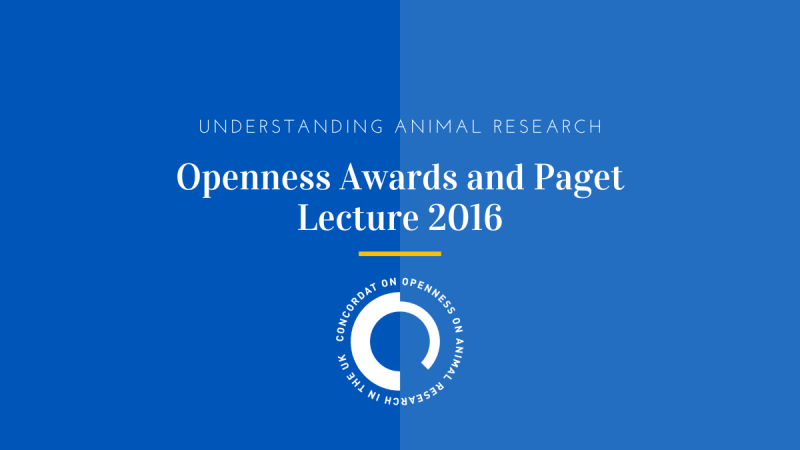Openness Awards and Paget Lecture 2021
On Monday, 6 December 2021, UAR hosted the eighth annual Openness Awards and 84th Stephen Paget Memorial Lecture at the Royal College of Physicians in London.
Concordat on Openness Annual Report
Professor Jeremy Pearson, Chair of UAR’s Council and Associate Medical Director at the British Heart Foundation, welcomed the publication of the seventh annual Concordat report. This May we celebrated seven years since the launch of the Concordat on Openness on Animal Research in the UK, and we continue to see signatories embedding best practices into their communications and developing innovative openness campaigns and projects.
Signatories were asked to report their openness progress between May 2020 and May 2021, a period that included multiple national lockdowns and lots of uncertainty. Due to restrictions on physical events, engagement around the use of animals in research slowed down, but it certainly didn’t stop. We have seen a huge move to engaging digitally, whether that is via social media campaigns, website updates, virtual tours, or online public engagement activities.
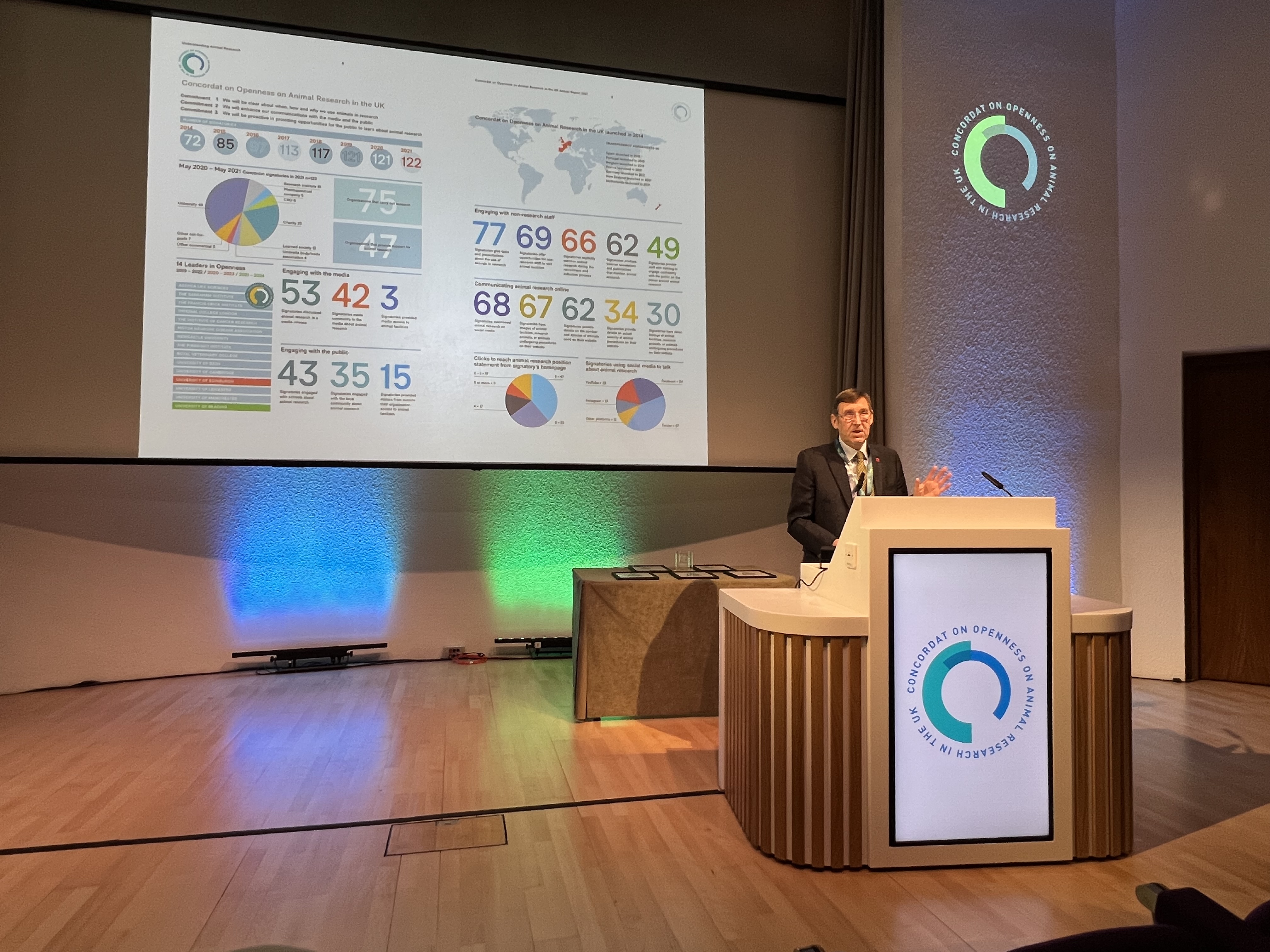
The Openness Awards
The first award of the evening was presented by Clare Standford, Professor of Translational Neuropharmacology at UCL and the 2021 Paget Lecturer, to Agenda Life Sciences for its Discovery Park Vlog series, an innovative video series that presents a side to animal facilities that we haven’t seen before.
Agenda has recorded the refurbishment of an old animal facility as it is modernised to meet the high standards of 2021 and have captured the processes of transforming it over time. The judging committee was impressed by the honesty of the piece, showing that everything is not perfect all the time and that sometimes there is a need to update and change spaces and practices.
While the audience for these videos will largely be from the bioscience sector, the decision to place them in the public domain to provide people with insights into the expected conditions for housing animals, how welfare measures are considered in practice, and the role of an establishment licence holder is original. Previously this type of information would have been available to a few insiders, but these videos have shown that it can be made openly available to anyone who is interested in how animal facilities are designed and run. It may even have a role to play in supporting people who are new to animal research and getting to know the licensing process, such as new technicians, AWERB members or establishment licence holders.
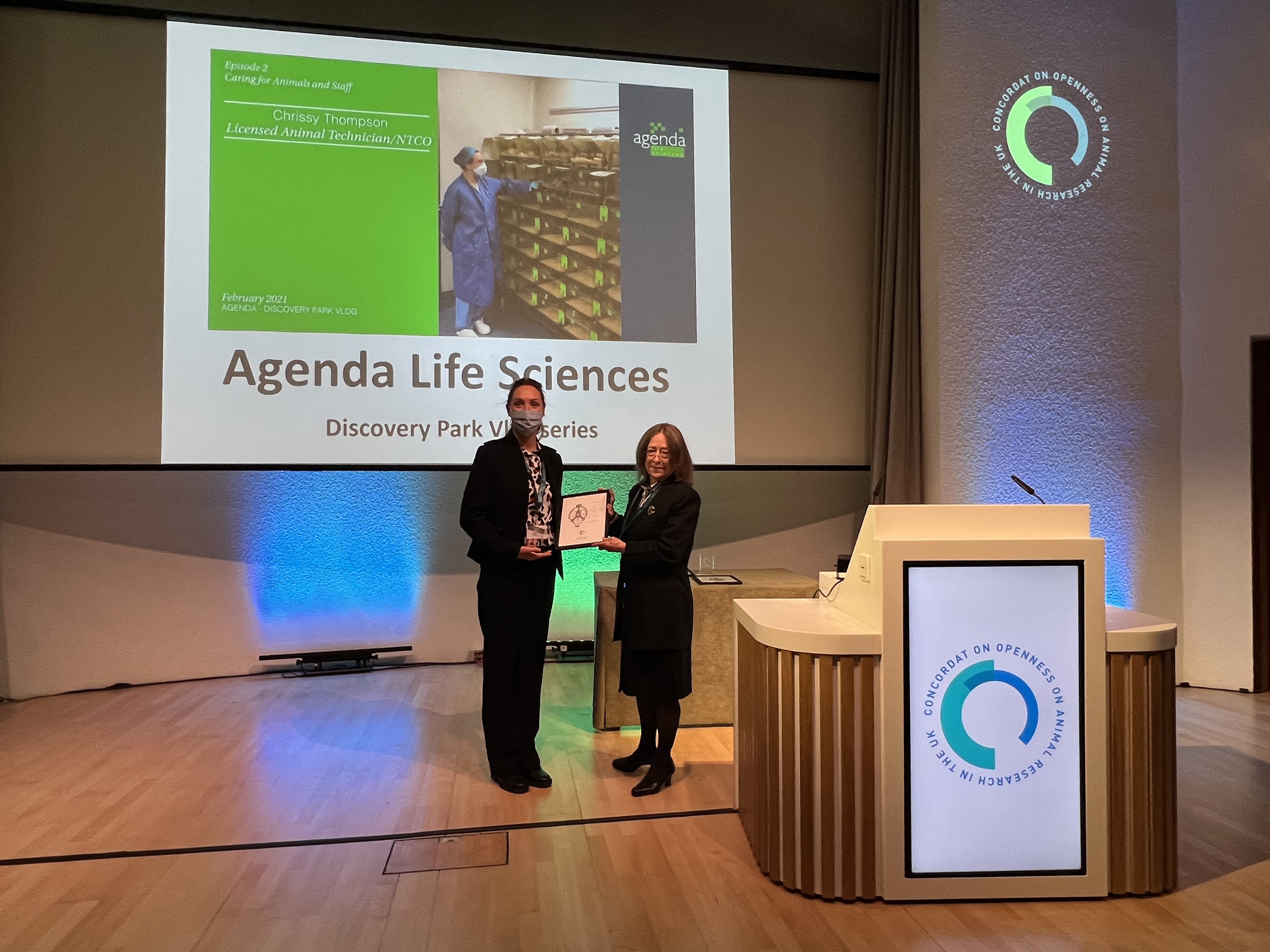
The second award was presented by Rachel Lambert-Forsyth, Chief Executive of the British Pharmacological Society and Managing Director of BPS Assessment Ltd to The Pirbright Institute for their internal engagement practices.
The Pirbright Institute has exemplary internal engagement practices, and a joined-up approach to research that ensures clarity, and that no one in the organisation is unaware of the research that goes on there.
Not only is the institute's research widely discussed and disclosed, but there are ample opportunities for staff to voice concerns, find out more, and be involved with oversight. The judges were particularly impressed by the fully open-door policy on AWERB meetings, which enables all staff to engage with and take responsibility for the regulated research carried out. The judges were also impressed to see posters that display animal work undertaken at the institute, ensuring awareness of this type of research, even for those who don’t read the institute's website. The Institute's whistleblowing process is also clear and well-considered to ensure that staff feel comfortable raising concerns.
While these individual practices are not unique to this institute, the joined-up approach to put new recommended practices in place is exceptional and deserves recognition. The judging committee felt that while others should be taking these bold steps towards connecting openness and animal welfare, no other approaches, so far as they are aware, are so cohesive.
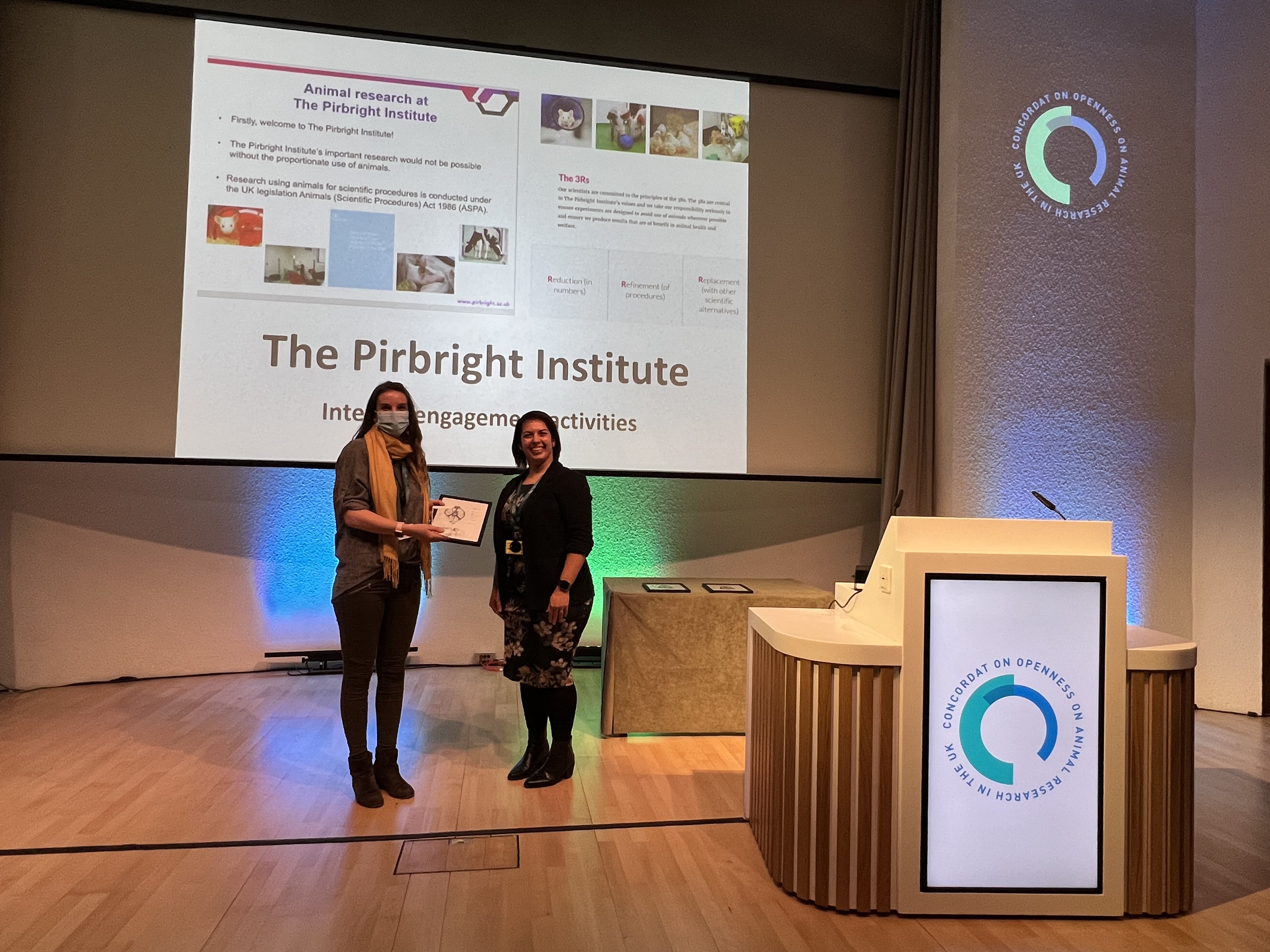 The third and final award of the night was presented by Jan-Bas Prins, Director of the Biological Research Facility of the Francis Crick Institute to the University of Cambridge for its animal research website and continuing to raise the level of challenge in the stories they tell about their research.
The third and final award of the night was presented by Jan-Bas Prins, Director of the Biological Research Facility of the Francis Crick Institute to the University of Cambridge for its animal research website and continuing to raise the level of challenge in the stories they tell about their research.
This university’s website remains the best example of a website about the use of animals in research.
The animal research webpages are so comprehensive and prominently placed on the university’s website, that it would be extremely difficult for a website visitor, whether a prospective student, a current member of staff or a member of the public to remain unaware that the university uses animals in its research.
Research organisations are developing their websites all the time and the bar is now high, but what makes this website exceptional is its use of media. The videos on the websites provide real insights into this organisation’s research. The level of challenge they present includes imagery that goes well beyond showing stock animals in cages, but rather showing clinical signs of OCD and how it affects the animal models. They talk through how, when and why animals are used in detail and do not shy away from potential areas of concern or controversy.
While the university has previously won an Openness Award for its use of video, the judging committee felt that the recent articles added to its website were equally impressive. Again, the university chooses a visually challenging area but was not afraid to show the realities and potential benefits of their research.
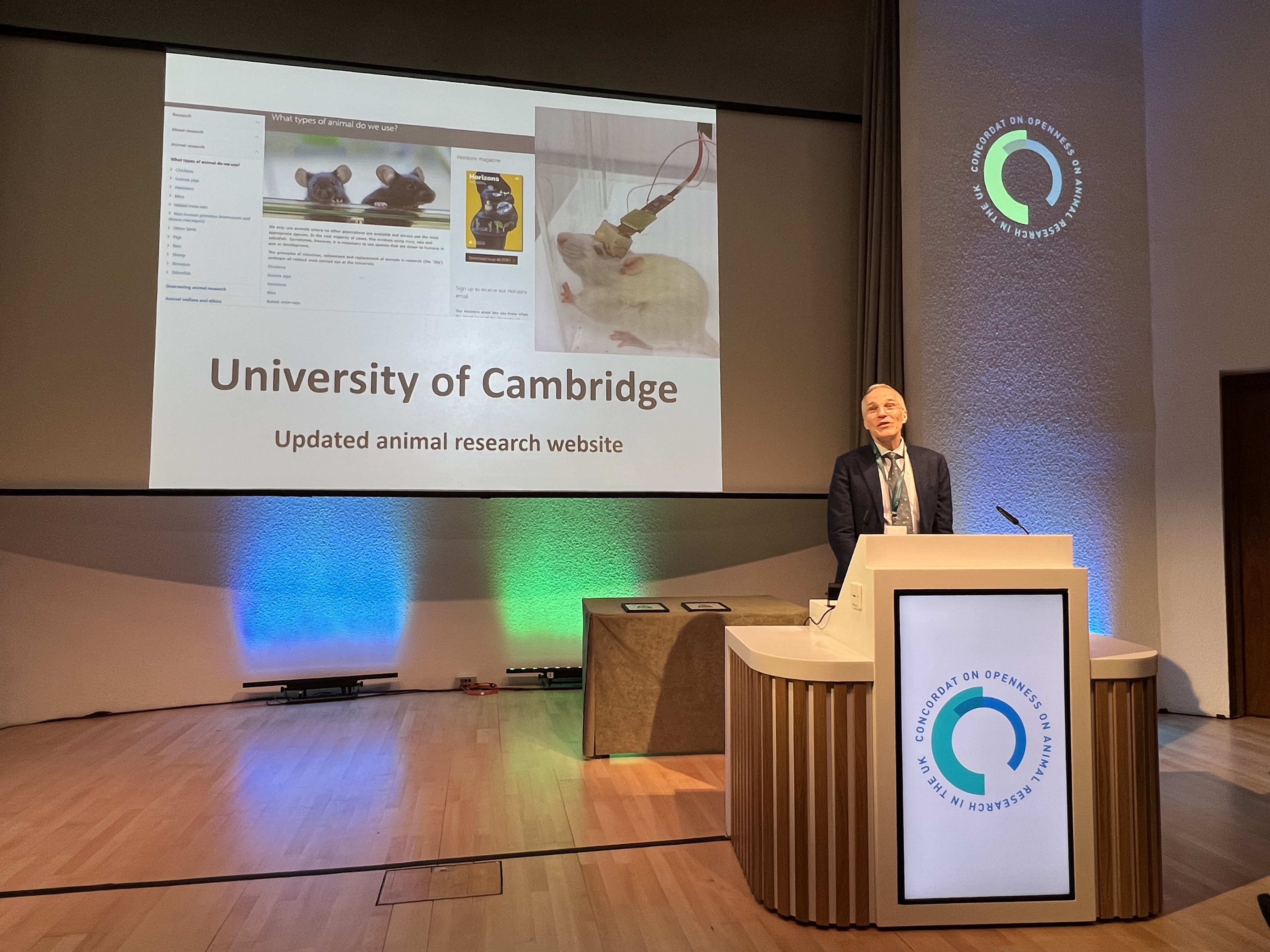
Many thanks to all our presenters and a huge congratulations to all the Openness Award winners.
The Stephen Paget Memorial Lecture
The Stephen Paget Memorial Lecture celebrates the life of Stephen Paget who passionately believed that a greater understanding of physiology would lead to better medical advances. He was the founder of the Research Defence Society which later became Understanding Animal Research. This year Professor Clare Stanford presented the 84th Paget Lecture, with her talk ‘Tortoises, hares and other animals on the pathway to antidepression’.
Clare is Professor of Translational Neuropharmacology at UCL. Her research, which focuses on how monoamines influence mood and behaviour, has involved both human studies and preclinical neuropharmacology. Reflecting her commitment to the 3Rs and welfare in research that uses animals, she is currently a member of the national Animals in Science Committee and a LASA trustee.
Before the lecture, UAR interviewed Clare about her career.
Clare’s Paget lecture Tortoises, Hares and Other Animals on the Pathway to Antidepression took the audience on a journey through her research career, from her early days as a research student at Oxford through to her long tenure at UCL, as she and her collaborators sought to understand what makes a drug antidepressant. She took as through the discoveries that led to changing ways of viewing human depression as biomarkers, tests and animal models were developed to help understand some of what happens in a depressed or stressed brain, and why.
She showed that some research programmes: the ‘tortoises’, are only fully recognised after many years, moving slowly but surely towards an eventual impact. For example, it took decades for the idea that rodent-handling can be stressful to them, confounding experimental data, to gain recognition and for practices to change. For other findings: the ‘hares’ the data yielded serendipitous discoveries that quickly led to new understanding and ideas, not only for depression but also impacting other fields of study such as obesity and ADHD research.
Transcripts for previous Paget Lectures going back to 1927, and videos going back a little less far, can be found here.

Last edited: 28 October 2022 15:07

